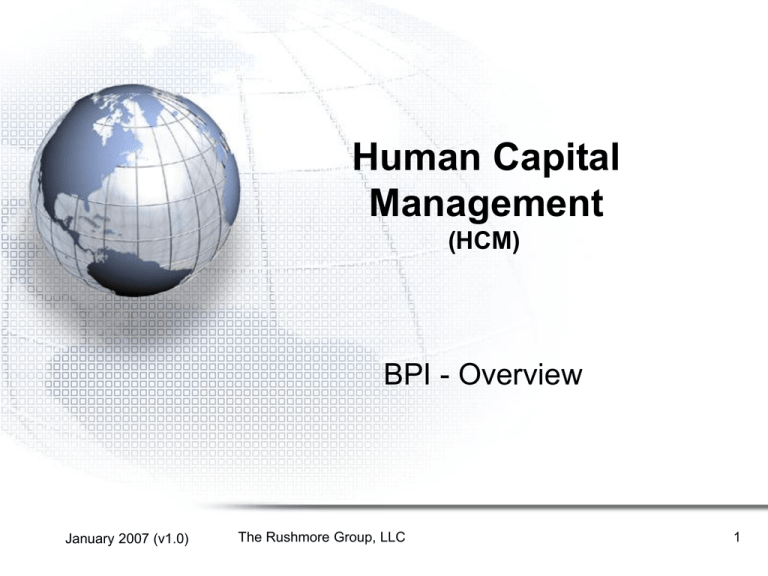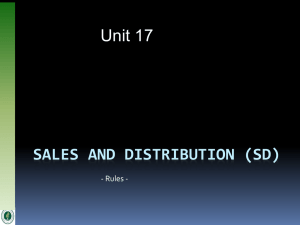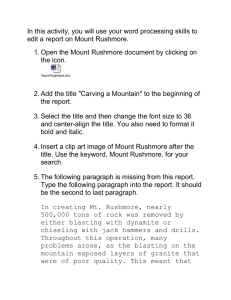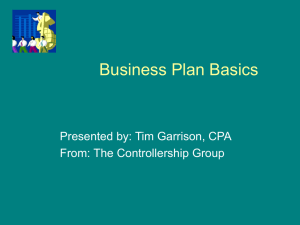Sales and Distribution SD
advertisement

Human Capital Management (HCM) BPI - Overview January 2007 (v1.0) The Rushmore Group, LLC 1 Goal of HCM • Right People for Right Job at the Right Time • Functions – – – – – – determining staffing needs recruitment and training time management performance issues and performance monitoring compensation and benefits proper alignment of corporate and personnel goals January 2007 (v1.0) The Rushmore Group, LLC 2 Shift in HCM • Effects of Globalization and Technology – Stereotype shift • • • • Payroll Personnel Department Human Resources Human Capital Management – shift from brute labor force to quality workers » get rid of the fishing nets and bring in the lines – transform employees into competitive resources January 2007 (v1.0) The Rushmore Group, LLC 3 Modules within HCM • Personnel Management – HR Master Data, Personnel Administration, Info. Systems, Recruitment, Benefits & Salary Administration, • Organizational Management – Organizational Structure, Staffing Schedules, Job Descriptions, Planning Scenarios, Personnel Cost Planning • Payroll Accounting – Payroll Administration, Payroll Simulation • Time Management – Shift Planning, Work Schedules, Time Recording, Absence Determination • Personnel Development – Career/Succession Planning, Profile Match-ups, Training, TEMs January 2007 (v1.0) The Rushmore Group, LLC 4 Integration of HCM • HCM with Production – Shift Planning (Capacity) • HCM with FI/CO – Payroll – Personnel Cost Planning • HCM with MM – TEMs (Training and Event Management) • HCM with SD – Salespeople - Commissions January 2007 (v1.0) The Rushmore Group, LLC 5 Organizational Data • A hierarchy in which the organizational units in an enterprise are arranged according to task and functions • Are static data and are rarely changed • The definition of organization units is a fundamental step, it is a critical factor in how the company will be structured January 2007 (v1.0) The Rushmore Group, LLC 6 Structure of HCM • Enterprise Structure • Personnel Structure • Organizational Structure January 2007 (v1.0) The Rushmore Group, LLC 7 Organizational Structure for HCM • Enterprise Structure – This structure makes up the legal identity of the company – The Enterprise Structure is made up of the following elements: • • • • Client Company Code Personnel Area Personnel Subarea January 2007 (v1.0) The Rushmore Group, LLC 8 Enterprise Structure • Client – technical structure feature • Company Code – highest level of the enterprise structure • Personnel Area – divides the company into sub-units (unique to a client) – locations or divisions • Personnel Subarea – subdivision of the personnel area (the grouping of the personnel area and subarea must be unique to a company code) – departments January 2007 (v1.0) The Rushmore Group, LLC 9 Enterprise Structure: Pen Inc. Client Client 420 Company Code Pen Inc 100 Personnel Area Personnel Subarea January 2007 (v1.0) P100 P101 Pen Inc. Central Office Pen Inc. MFG Center 0001 0002 0001 Administration Finance Manufacturing The Rushmore Group, LLC 10 Personnel Structure • This structure describes an employee’s position within the company in regards to work hours and compensation • The Personnel Structures is made up of the following elements – Employee Group – Employee Subgroup – Payroll Area January 2007 (v1.0) The Rushmore Group, LLC 11 Personnel Structure: Elements • Employee Group – represents a division of the companies employees and establishes a relationship between the company and the employee – defines the extent which the employees capacity is available to for the company • Active Employee, Pensioner, Interns, External Employee January 2007 (v1.0) The Rushmore Group, LLC 12 Personnel Structure: Elements • Employee Subgroup – refines the relationship between company and employee • Standard Salary, Executive Salary, Daily Wage, Hourly Wage, Etc. – control features for the personnel structure are defined at this level. • employee relationship with payroll • eligible work schedules, wage types, attendance policy, restrictions for collective agreement provision January 2007 (v1.0) The Rushmore Group, LLC 13 Personnel Structure: Elements • Payroll Area – groups employees together that are paid the same (time) • Weekly, Bi-Weekly, Monthly – the payroll area is determined from a combination of the Employee Group and Employee Subgroup • number of employees in the payroll run • specific dates of the payroll run January 2007 (v1.0) The Rushmore Group, LLC 14 Organizational Structure • This is an overview of your Company’s Organizational Plan (Org. Hierarchy) – Depicts the reporting structure and task distribution • The Organization Structure is made up of the following elements – Organizational Unit • represent functional units within an enterprise (ex. departments) – Position • spots that are occupied by individuals (Salesperson) – Job • classifications of functions within an enterprise – ex. Job: Officer, which is used for Positions: CEO, CFO, COO • job description for numerous positions – Person • the individual, he/she is assigned to a specific position January 2007 (v1.0) The Rushmore Group, LLC 15 Organizational Structure: Pen Inc Organizational Units Position Person January 2007 (v1.0) The Rushmore Group, LLC 16 HCM: Master Data • Master data is relatively fixed – Record that contains all the necessary information to conduct business transactions – Information within a master record can and will change, our hope is that it does not change frequently. • Before making the master data configurations, you must have completely defined the organizational structures January 2007 (v1.0) The Rushmore Group, LLC 17 Employee Data • Information must be recorded and maintained effectively for every employee – Infotypes (Information Types) are units of information that aid in the entry of master data and group like information together • Status of the Employee will determine what information should be gathered – Active vs. Intern – Exempt vs. Non-exempt January 2007 (v1.0) The Rushmore Group, LLC 18 Employee Data: Infotypes • Numerous infotypes will be created for each employee – Organizational Assignment must be the first infotype recorded January 2007 (v1.0) The Rushmore Group, LLC 19 Employee Data: Infosubtypes • Certain data that is entered in an infotype can trigger the need for a infosubtype – ex. Family Member/Dependents • If you enter that you are married or have children it will generate the need for a spouse/child infosubtype to capture the information about the spouse or child(ren) • Subtypes also allow you to account for time constraints – Different addresses may be current at the same time • Permanent Residence • Temporary Residence • Home address January 2007 (v1.0) The Rushmore Group, LLC 20 Employee Data: Personnel Actions • Personnel actions are a series of predefined infotypes that are grouped together to speed the data entry process – Hiring, Firing, Reassignment, Retiring – would all be examples of procedures that could be represented by a Personnel action • Personnel Actions enable users to enter information about an employee without having to access each individual infotype January 2007 (v1.0) The Rushmore Group, LLC 21 Personnel File • Information maintained about an employee is stored in their Personnel File January 2007 (v1.0) The Rushmore Group, LLC 22 HCM: Process/Functions Hire Employee Recruitment Training and Development Cost Planning Reporting ESS Employee Self-Service Payroll Administration January 2007 (v1.0) The Rushmore Group, LLC Manage Work Time (CATS) Compensation & Benefits 23 Recruitment – Selection - Hiring Applicants Advertising Vacancy Hire January 2007 (v1.0) Select & Notify The Rushmore Group, LLC Profile Match 24 HCM Process: Recruitment • allows you to monitor and meet the personnel requirements within the company • determines vacancies within the company – maintained by Personnel or Line Managers – the system will generate a list of all positions that are marked vacant • once a vacancy has been identified advertising can be initiated January 2007 (v1.0) The Rushmore Group, LLC 25 Recruitment: Advertising • Vacancies are published in advertisements – internal or external announcement of a position • The advertisements are recorded in the system enabling you to gather information about that advertisement – – – – cost applications medium recruitment instrument January 2007 (v1.0) The Rushmore Group, LLC 26 Recruitment: Applicant Administration • allows a company to coordinate and monitor all the steps involved in the applicant process • Applicant Administration is a combination of – receiving applications – profile match – selection of applicants January 2007 (v1.0) The Rushmore Group, LLC 27 Recruitment: Applicant Administration • Maintaining applications – Applicants are the central object of Recruitment • it is a person who expresses interest (through job application) in employment or position change within the company – All applicants must be maintained in the system • maintenance responsibility must be delegated (one or more people) • the status of the applicant will determine the information that is needed • Profile Matching – Compares skills of the applicant to the requirements of the position • can the applicant offer what the company needs – is there another vacant position that he/she would have a better match January 2007 (v1.0) The Rushmore Group, LLC 28 Recruitment: Applicant Administration • Selection – Applicant Activities aid in Selection process • used to enter, log, and plan all the tasks for an applicant during the selection process – Activity Types: mail confirmation of receipt, mail invitation to interview, schedule appointment for interview, reject applicant, offer contract » depending on the activity and the system output can be generated automatically – Activity Status: planned, completed – Performance Date: when it was carried out – Person Responsible: person responsible for carrying it out – Upon completion of qualification review and interviews the position must be filled January 2007 (v1.0) The Rushmore Group, LLC 29 HCM Process: Hiring • Master data (information) is obtained during the hiring process (employee data) • Personal Data, Payroll Data, Time Data, Etc. • Hiring can be integrated with Recruitment • information obtained about an applicant can be copied into his/her personnel record • Hiring can be done independently of Recruitment • through the Hiring personnel action (infotypes) January 2007 (v1.0) The Rushmore Group, LLC 30 HCM Process: Personnel Development • Personnel Development component is used to assess and create employee “value” that can be utilized by the company. • Purpose is to manage the work efforts and develop the work skills of employees within the company • A company’s Personnel Development needs are determined by comparing current or future work requirements with employees’ qualifications, preferences, and aspirations. • Personnel Development comprises of the following components: – – – – Qualifications/Requirements Appraisal Systems Career and Succession Planning Development Plans January 2007 (v1.0) The Rushmore Group, LLC 31 HCM Process: Training & Development Personnel Development Career & Succession Planning creates Training based upon Qualifications/ Requirements January 2007 (v1.0) Development Plan determine Appraisals generate The Rushmore Group, LLC 32 HCM Process: Training & Development • Qualifications/Requirements – this component is used to define, structure, and manage your qualifications catalog • the catalog enables you to place requirements on positions and qualifications on employees (or applicants) within the company – perform profile match-ups (people and positions) – run reports to recognize qualification deficits and enact training measures January 2007 (v1.0) The Rushmore Group, LLC 33 HCM Process: Training & Development • Appraisal Systems – used in • Personnel Administration – as an instrument to evaluate members of your organization in a planned, formalized and standardized manner • TEMs – training appraisals – attendance appraisals • Compensation Management – appraisal results can be used to influence remuneration January 2007 (v1.0) The Rushmore Group, LLC 34 HCM Process: Training & Development • Career and Succession Planning – Career Planning • planning functionality that allows you to analyze an employees skills, preferences, dislikes, qualifications, potential and determine positions they should hold during their tenure at the company – Succession Planning • planning functionality that allows you plan for positions in the company that will need to be filled because of turnover (or new position) • enables a company to analyze employees and determine and prepare potential replacements January 2007 (v1.0) The Rushmore Group, LLC 35 HCM Process: Training & Development • Development Plans – a series of development measures and information on the sequence in which they should be passed through and time requirements to provide an individual with a specific qualification • Generic Plans – training program (all prospective sales reps must complete a course on Fundamental Selling Techniques) • Individual Plans – comprises of all the items that a person has completed, is currently involved in, or will be involved in the future – proposes needed course work (integration with TEMs) January 2007 (v1.0) The Rushmore Group, LLC 36 HCM Process: Training & Development • Training – enable new hires and current employees access to the necessary resources to build job skills needed for both current and future task assignments • this is figured through Qualifications/Requirements reports, development plans, career planning, etc – Encourage continually learning and professional development • SAP offers a powerful resource to assist in scheduling training TEMs January 2007 (v1.0) The Rushmore Group, LLC 37 HCM Process: Training & Development • Training and Event Management (TEMs) – Component that enables a company to manage, track, and plan various different business events – Helps determine demand for courses and schedule dates, manage the resources, attendees, and costs associates with the event January 2007 (v1.0) The Rushmore Group, LLC 38 HCM Process: Training & Event Mgmt • TEMS Catalog Structure – Business Event Groups • Used to classify business event types – Business Event Types • Time independent description of a business event – Business Events • Actual time based event that is to take place January 2007 (v1.0) The Rushmore Group, LLC 39 HCM Process: Training & Event Mgmt – Integration Points MM FI Personnel Development SD TEMS HCM Time Management Organizational Administration January 2007 (v1.0) CO The Rushmore Group, LLC Personnel Administration 40 HCM Process: Time Management • supports planning, recording, and evaluation of internal employee time data • time data that would be gathered and evaluated – – – – – – hours worked leave illness overtime substitutions business trips • conference, training January 2007 (v1.0) The Rushmore Group, LLC 41 HCM Process: Time Management • There are multiple methods for data collection: Time Administrators Time Manager’s Workplace Time Terminals Cross Applications Time Sheet Employee Self Service Mobile Technology January 2007 (v1.0) The Rushmore Group, LLC 42 HCM Process: Time Management • Time collection will be used for: – – – – – – – payroll accounting personnel cost analysis internal cost allocations invoicing performance analysis capacity availability shift planning January 2007 (v1.0) The Rushmore Group, LLC 43 HCM Process: Compensation & Benefits • Compensation is not the cut-and-dry subject it once was – Past – consisted of an employee's base salary or, at most, a base salary and commission. – Today - looked at as compensation packages; including: • • • • • • salaries, stock options employee stock ownership plans pay-for-performance plans bonuses, profit sharing commissions, non-cash rewards variable pay, and much more. January 2007 (v1.0) The Rushmore Group, LLC 44 HCM Process: Compensation Management • The balancing of company interests to operate within the company's fiscal budget and fairly paying employees – key component of attracting, developing, retaining, and rewarding high quality staff through wages and salaries which are competitive in the labor markets • Compensation Management is comprised of the following components: – – – – Job Pricing Budgeting Compensation Administration Long-term Incentives January 2007 (v1.0) The Rushmore Group, LLC 45 HCM Process: Benefits Administration • benefits today are offered as a part of an employees overall compensation package • this component allows a company great flexibility in creating and maintaining individual packages for your employees – Six international Plan Categories • Allows for detailed company reporting – – – – Benefit Plan Participation Health Plan Costs Employee Demographics Benefits Election Analysis • Country Specific Settings available – FSA, COBRA (US examples) • HIPPA Certificates January 2007 (v1.0) The Rushmore Group, LLC 46 HCM Process: Payroll Administration • SAP contains an international payroll driver that is modified for each country • payroll is released for individual payroll areas – the run is for a specific group of employees and a specific period of time – upon release all affected personnel records are locked • will generate an payroll results, and earning statement, bank transfers and check payments January 2007 (v1.0) The Rushmore Group, LLC 47 HCM Process: Payroll Administration • Payroll Process – determine Gross Amount • base pay and any other additional payment – overtime, sick pay, Christmas bonuses, special pay – determine Deductions (Net Amount) • processes garnishments, deductions, taxes, and benefits for employees – Federal/State Income Tax, Insurance (Health, Life), Loans – Integration with Financial Accounting & Controlling • G/L postings, payments processed, reports available January 2007 (v1.0) The Rushmore Group, LLC 48 HCM Process: Cost Planning Reporting • used to analyze, monitor, plan a company’s personnel costs, wages, salaries, and employer contributions – cost plans are generated by developing and comparing multiple cost scenarios, these scenarios might be actual or projected January 2007 (v1.0) The Rushmore Group, LLC 49 HCM Process: Employee Self-Service • Employee Self-Service (ESS) – empowers employees to create, display, and change their own personal information • streamlines and simplifies the HR data entry process – some of the capabilities include • • • • • • • • • SAP Office – appointment calendar, employee directory Personal Information – address, bank information Time Management – record working time, request leave Business Trips – submit travel request, reserve flights, rooms, also expense reimbursement process Training – register for training, display your bookings Benefit Enrollment and Overview (Healthcare, Retirement, etc) Display Leave and Earnings Statements Qualification and Appraisal Review W-2 W-4 printout January 2007 (v1.0) The Rushmore Group, LLC 50



![Your_Solutions_LLC_-_New_Business3[1]](http://s2.studylib.net/store/data/005544494_1-444a738d95c4d66d28ef7ef4e25c86f0-300x300.png)
